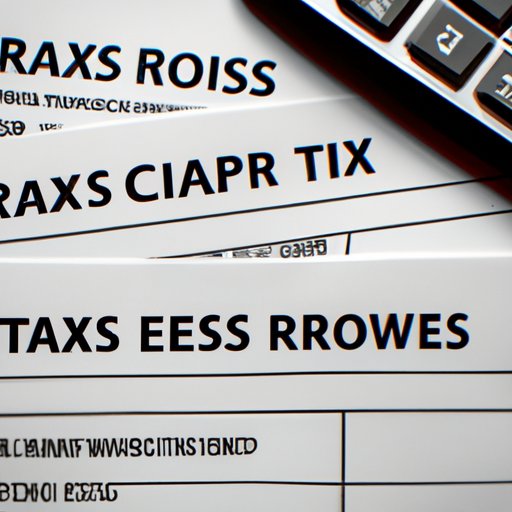
Introduction
Paying taxes is an essential part of being a responsible citizen. Not only does it help fund crucial government initiatives, but it also demonstrates a commitment to the betterment of society. However, paying taxes can be a complex process, and failing to pay on time can have serious consequences. It’s crucial to understand the different payment options available and to choose the method that works best for your financial situation.
Balancing the Books: Tips to Avoid IRS Issues While Staying Organized
One of the most important aspects of paying taxes is staying organized. By keeping accurate records of your income, deductions, and expenses, you can avoid making mistakes that could trigger an IRS audit. Here are some tips for staying organized:
- Keep detailed records of your income, including pay stubs, invoices, and receipts.
- Track your business expenses carefully, using software or spreadsheets to stay organized.
- Understand which deductions you qualify for and keep records of all expenses related to those deductions.
Additionally, you should make sure to avoid common bookkeeping mistakes, such as failing to report all income or taking deductions that you’re not eligible for.
What You Need to Know About Tax Payment Plans and How to Apply
If you can’t afford to pay your taxes in full, a tax payment plan or installment agreement may be the solution. Here’s what you need to know:
- A payment plan is an agreement between you and the IRS to pay your taxes over time.
- You’ll need to meet certain eligibility requirements, such as demonstrating that you can’t pay your taxes in full and that you’ve filed all required tax returns.
- You can apply for a payment plan online, by phone, or by mail.
When you apply for a payment plan, you’ll need to specify the amount you can pay each month and the date you’d like to make your payment.
How to Make a Payment Arrangement With the IRS
If a tax payment plan isn’t feasible, you may be able to set up a different type of payment arrangement. Here’s what you need to know:
- The IRS offers a variety of payment arrangement options, including partial payments, currently non-collectible status, and offers in compromise.
- You’ll need to contact the IRS directly to set up a payment arrangement.
- It’s crucial to negotiate the terms of your payment arrangement carefully, as defaulting on the agreement could result in serious consequences, such as wage garnishment or property seizure.
The Pros and Cons of Paying With a Credit Card
If you don’t have enough money to pay your taxes, you may be tempted to use a credit card to cover the balance. Here are some things to consider before you do:
- Paying with a credit card can help you avoid penalties and interest that could accrue if you don’t pay your taxes on time.
- However, using a credit card to pay your taxes can be expensive, as you’ll be charged processing fees and possibly interest on the balance.
- Additionally, if you can’t pay off the credit card balance quickly, you could end up paying significantly more in interest over time.
If you do choose to pay with a credit card, you can do so online, by phone, or by mail.
How to Negotiate a Tax Settlement with the IRS
If you owe a significant amount of money in taxes, you may be eligible for a tax settlement or offer in compromise. Here’s what you need to know:
- A tax settlement is an agreement between you and the IRS to settle your tax debt for less than the full amount owed.
- You’ll need to meet certain eligibility requirements, such as demonstrating that you can’t pay your full tax bill.
- You can negotiate a tax settlement by contacting the IRS directly or working with a tax professional.
When negotiating a tax settlement, it’s crucial to understand the terms of the agreement and to ensure that you’re not agreeing to more than you can realistically afford.
Creative Ways to Make Your Payments to the IRS That You Probably Didn’t Know About
If you’re looking for unconventional ways to pay your taxes, there are a few options you may not have considered:
- You can use crowdfunding platforms to raise money to pay your tax bill.
- Using cryptocurrency to pay your taxes is another option, although it’s important to note that the IRS has specific rules about how to report cryptocurrency income and losses.
While these creative payment methods may be tempting, it’s important to consider the potential risks and drawbacks before using them.
Conclusion
Paying taxes can be a complex process, but with the right knowledge and preparation, you can ensure that you’re making the best decisions for your financial situation. Whether you choose to set up a payment plan, negotiate a settlement, or use a credit card to pay your taxes, it’s crucial to make payments on time to avoid penalties and interest charges. If you’re feeling overwhelmed, consider reaching out to a tax professional for guidance and advice.




